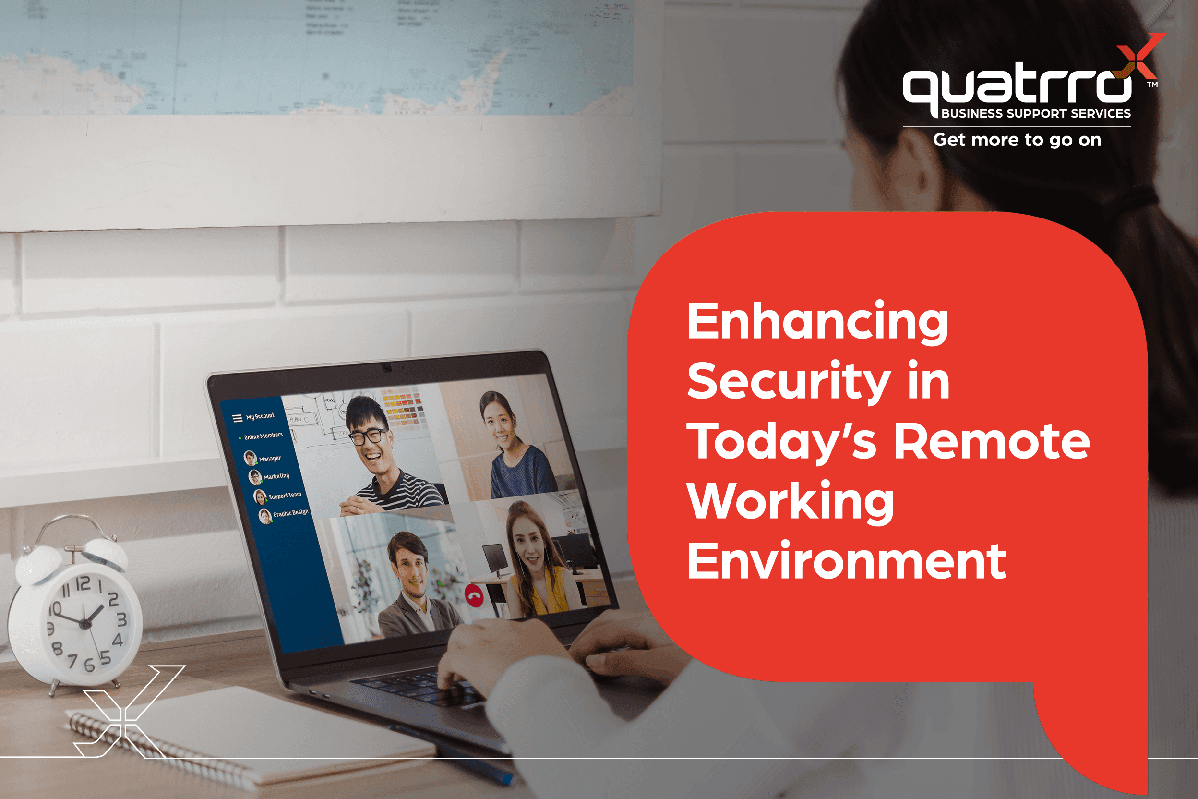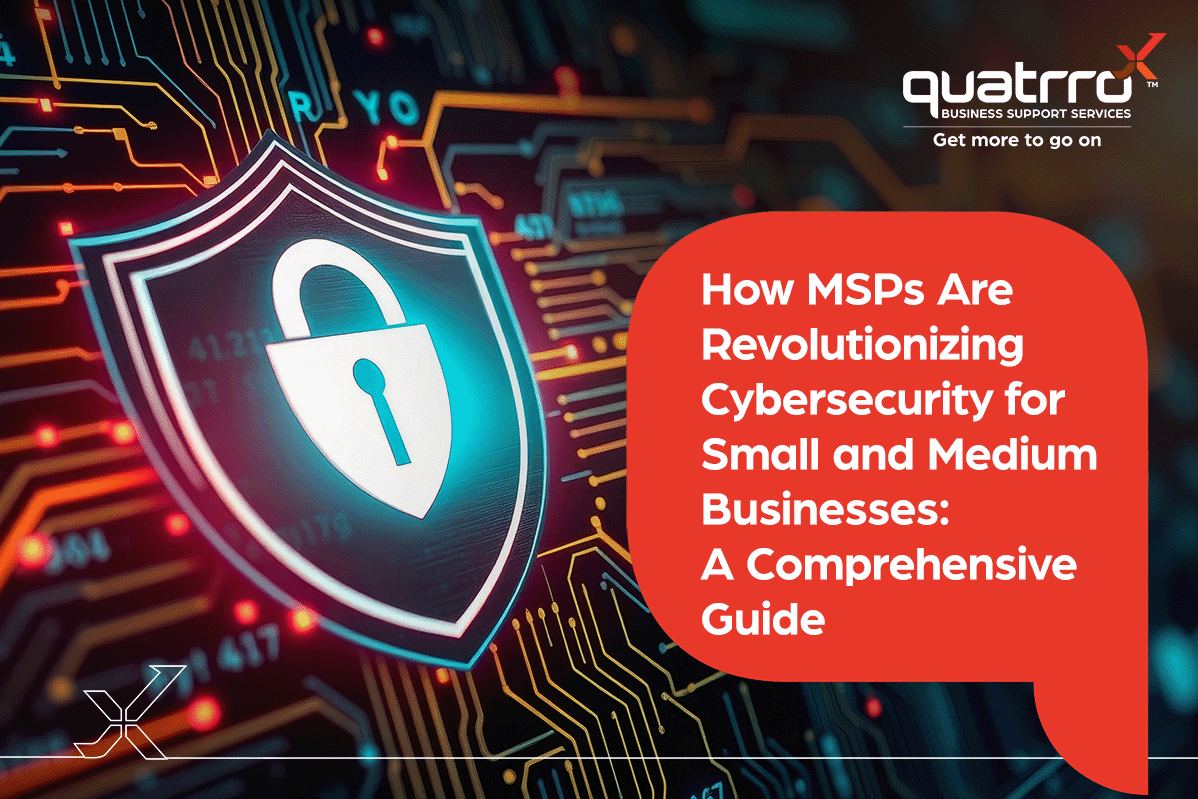Blog Details
Enhancing Security in Today’s Remote Working Environment
November 2, 2023

Introduction
Remote working has become increasingly popular in recent years, thanks to advances in technology and the growing acceptance of flexible work arrangements. However, remote working also poses unique security challenges.
Addressing the issue of security in remote working is essential for both employees and employers. Remote workers can safeguard themselves by taking steps such as using strong passwords, keeping their software up to date, and being mindful of what information they share online. Employers can also help to protect their remote workers by providing them with secure devices and networks, training them on security best practices, and implementing security policies and procedures.
Cyberattacks can have serious consequences for both employees and employers, including:
Financial losses
Data breaches
Damage to reputation
Legal liability
In some cases, cyberattacks can even lead to physical harm.
By taking steps to enhance security in remote working, organizations can protect their employees, their data, and their bottom line.
Understanding the landscape of remote working security
Remote work is rapidly evolving in the modern business world. As more and more organizations embrace remote work, it is important to understand the evolving security landscape and the challenges and vulnerabilities that remote work introduces.
The most common security risks associated with remote work include:
 |
Weak passwords and password hygieneRemote employees may be more prone to using weak passwords or reusing passwords across different accounts. This can make it easier for attackers to obtain access to the devices and accounts of remote workers. |
 |
Unsecured networksRemote employees often access the company’s data and system through their own personal networks. These networks may not be as secure as corporate networks, making them more vulnerable to cyberattacks. |
 |
Lack of awarenessRemote employees may be less aware of best practices in security or are less inclined to obey the company’s security policies. As a result, they may be more vulnerable to phishing attacks and other social engineering schemes. |
 |
Malware and virusesRemote employees may be more likely to unknowingly download malware or viruses on their devices. This allows attackers to gain access to company data and systems. |
Remote work introduces a number of challenges and vulnerabilities, including:
 |
Increased attack surfaceRemote employees often use their own personal devices and networks to access company data and systems. This increases the attack surface for organizations, making them more vulnerable to cyberattacks. |
Lack of visibilityIt can be more difficult for organizations to monitor and manage the security of remote employees’ devices and networks. This can make it easier for attackers to operate undetected. |
|
 |
Compliance challengesOrganizations must comply with numerous data privacy and security regulations. Remote workers can make it more challenging for them to comply with these regulations. |
Need for a strategic approach
Given the evolving nature of remote work and the challenges and vulnerabilities it introduces, organizations must take a strategic approach to remote work security.
This approach should include the following elements:
Security education and training: Organizations should provide frequent security education and training to their remote staff. This training should cover topics such as password hygiene, social engineering, and malware prevention.
Security policies and procedures: For its remote workforce, organizations should have clear and simple security rules and procedures in place. These rules and procedures should address issues such as device security, data management, and incident reporting. It is also important to note that these policies and procedures should be communicated regularly to keep them top of mind for remote workers.
Security tools and technologies: Organizations should equip remote staff with the necessary security tools and technologies to protect their devices and data. This may include tools such as antivirus software, firewalls, and VPNs.

The root causes of security breaches in remote work
Security breaches in remote working environments are often caused by a combination of factors, including:
Inadequate Authentication and Authorization:
Weak or compromised passwords.
Lack of two-factor authentication (2FA).
Employees sharing login credentials.
Unsecured Network Connections:
Use of unsecured public Wi-Fi networks.
Failure to use VPNs (Virtual Private Networks) for secure connections.
Phishing and Social Engineering:
Employees falling for phishing emails or social engineering attacks.
Lack of security awareness training.
Insecure Devices:
Use of unpatched or outdated devices and software.
Insecure personal devices used for work.
Lack of Endpoint Security:
Insufficient antivirus and anti-malware protection.
Failure to implement endpoint detection and response (EDR) solutions.
Data Leakage and Loss:
Insecure file sharing and storage practices.
Lack of encryption for sensitive data.
Unauthorized Access:
Weak access controls and permissions.
Insufficient monitoring of user activities.
Unsecured Video Conferencing:
Unauthorized access to video conferencing meetings.
Failure to set up password protection for meetings.
Shadow IT:
Employees using unapproved software and tools for work.
Lack of visibility into the tools being used.
Inadequate Policies and Procedures:
Lack of clear remote work security policies.
Failure to enforce security measures and best practices.
Physical Security:
Inadequate physical security for remote work environments.
Theft or loss of devices containing sensitive information.
Compliance Issues:
Failure to comply with industry-specific regulations.
Data protection and privacy violations.
Third-Party Risks:
Security vulnerabilities in third-party software and services.
Insufficient due diligence when selecting third-party vendors.
Insider Threats:
Malicious actions by employees or contractors.
Disgruntled employees with access to sensitive data.
Resource Constraints:
Lack of resources and budget for proper security measures.
Inadequate IT support for remote employees.
The following real-world examples and statistics underscore the severity of the issues discussed above:
A recent study by IBM found that the average cost of a data breach is now $4.35 million.
A study by Verizon found that 82% of data breaches involve the human element, such as phishing or social engineering attacks.
A study by the Ponemon Institute found that 68% of organizations have experienced a data breach in the past year.
The Role of IT outsourcing in mitigating security risks
IT outsourcing can play a significant role in helping organizations to mitigate the security risks associated with remote work.
Here are some of the key benefits of outsourcing for enhancing remote work security:
 |
Access to specialized expertise:Outsourcing providers have the expertise and experience needed to manage and secure remote work environments. They can assist organizations to develop and implement security policies and procedures, select and deploy security tools and technologies, and provide security education and training to remote employees. |
 |
Robust security infrastructure:Outsourcing providers can provide organizations with access to robust security infrastructure, such as data centers, firewalls, and intrusion detection systems. This infrastructure can help to protect remote employees from a wide range of cyberattacks. |
 |
24/7 monitoring and incident response:Outsourcing providers can provide 24/7 proactive monitoring and incident response services. This means that organizations can be confident that their remote workforce is protected even when their IT staff is not available. |
 |
Scalability and flexibility:Outsourcing providers can provide organizations with the scalability and flexibility they need to support their remote workforce. As the organization's workforce grows, the outsourcing provider can scale its services to meet the organization's needs without having to increase their overhead cost accordingly. |
When choosing an IT outsourcing partner to manage remote work security, organizations should consider the following key factors:
Expertise: The outsourcing provider should have the expertise and experience to manage and secure remote work environments.
Security infrastructure: The outsourcing provider should have access to robust security infrastructure, such as data centers, firewalls, and intrusion detection systems.
24/7 monitoring and incident response:The outsourcing provider should be able to provide 24/7 proactive monitoring and incident response services with defined Service Level Agreements (SLA’s).
Scalability and flexibility: The outsourcing provider should be able to scale its services to meet the organization's needs as it grows.
Reputation: The outsourcing provider should have a good reputation in the industry.

Tailoring outsourcing solutions for remote work security
Some of the key areas that should be considered when tailoring outsourcing solutions for remote work security include:
Access control: Outsourcing partners can help organizations to implement strong access control measures for their remote workforce. This may include measures such as multi-factor authentication and role-based access control.
Data encryption: Outsourcing partners can assist organizations in encrypting their data, both at rest and in transit. Even if the data is compromised, this helps to safeguard it from unauthorized access.
Device security: Outsourcing partners can assist organizations to secure their remote workers' devices. This may include measures such as mobile device management (MDM) and security software deployment.
User training: Outsourcing partners can help organizations to train their remote workers on security best practices. This training should cover topics such as password hygiene, phishing awareness, and social engineering. The training program often even includes periodic testing of employees to ensure they do not click on emails they should not click on per their training.
Incident response: Outsourcing partners can help organizations to develop and implement incident response plans for remote work environments. The outsourcer can assist with setting up regular data backups that become critical as part of an incident response plan. This helps organizations to respond quickly and effectively to security incidents.

By outsourcing remote work security to a qualified partner, organizations can free up their IT staff to focus on other strategic tasks and initiatives, while also gaining access to specialized expertise and robust security infrastructure.
Overcoming common concerns about outsourcing security
Businesses may have a number of concerns about outsourcing their security, including:
Data privacy and compliance concerns Businesses must have confidence that their outsourced security provider will safeguard their data and adhere to all applicable data privacy and security standards
Cost considerations: Outsourcing security can be expensive, especially for small businesses. Businesses need to weigh the cost of outsourcing against the benefits of improved security and decreased risk of attack.
Integration challenges: Integrating an outsourced security provider into an organization's existing IT environment can be challenging. Businesses need to ensure that the outsourced provider's systems and processes are compatible, or aligned, with their own.
Here are some insights on how to navigate and mitigate these concerns effectively:
Data privacy and compliance:
When choosing an outsourced security provider, businesses should carefully review the provider's security policies and procedures. They should also ensure that the provider has a good track record of protecting data and complying with regulations. Businesses should also sign a service level agreement (SLA) with the provider that outlines the provider's security obligations and the business's rights in the event of a data breach.
Cost considerations:
Businesses should carefully consider their security needs and budget when deciding whether to outsource security. They should also obtain quotes from multiple providers to compare prices. Some providers offer tiered pricing plans that can help businesses to stay on budget. Be sure you are making an apples-to-apples comparison though between providers when making your decision.
Integration challenges:
Businesses should work closely with their outsourced security provider to develop and execute a detailed plan for integrating the provider's systems and processes into the organization's existing IT environment. This plan should include a timeline for integration and a process for testing and troubleshooting.
The long-term advantages of a secure remote work environment
Investing in remote work security through outsourcing can have a number of lasting benefits for organizations. Here are a few of the most notable benefits:
Enhanced reputation and trust:
Customers and partners are more likely to trust and do business with organizations that can demonstrate their commitment to protecting data and preventing cyberattacks.
Cost savings in the long run:
While outsourcing remote work security can be a significant investment upfront, it can save organizations money in the long run. This is because outsourced security providers can help organizations to avoid the costs associated with data breaches and other security incidents. Additionally, outsourced security providers can help organizations to optimize their security costs by providing them with access to the latest security technologies and expertise.
Business continuity and resilience:
A secure remote work environment can help organizations to maintain business continuity and resilience in the event of a disaster or other unforeseen event. By allowing employees to work remotely, organizations can reduce their reliance on physical office space and avoid disruptions caused by events such as natural disasters or pandemics.
Strategic advantage:
Organizations with secure remote work practices have a strategic advantage over their competitors. This is because they are able to attract and retain top talent from around the world, and they are also able to operate more efficiently and effectively.
Conclusion
Remote working has become the norm for many businesses, but it introduces a number of security challenges. By understanding the root causes of security breaches in remote work environments and taking steps to mitigate these risks, organizations can protect their data, their employees, and their bottom line.
One of the most effective ways to enhance security in remote working environments is to outsource security to a qualified partner. Outsourcing providers have the expertise and experience to manage and secure remote work environments. They can help organizations to develop and implement security policies and procedures, select and deploy security tools and technologies, and provide security education and training to remote workers.
Let Us Help Secure Your IT Environment
Remote work is here to stay, and organizations that are considering remote work should take steps to enhance security in their remote work environment. By taking proactive measures to protect their data, their employees, and their bottom line, organizations can avoid costly and damaging cyberattacks.
If you are concerned about the security of your remote workforce, we encourage you to reach out for a consultation with one of our security experts. Don't wait until it's too late. Contact us today to learn more about how we can help you to enhance security in your remote work environment.








